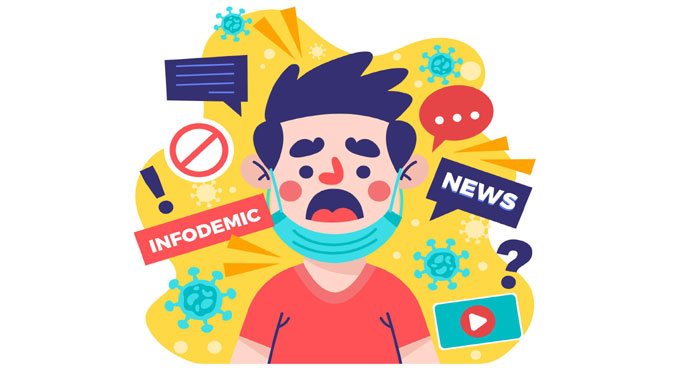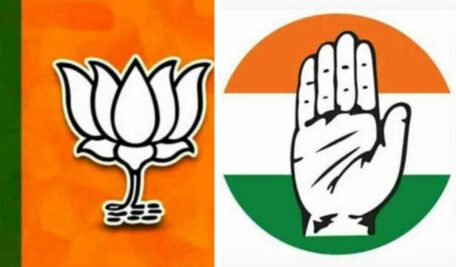Here’s how you can tackle fake information during the pandemic
With Covid-19 cases rising every day, misleading information doing rounds on social media is on the rise

Social media is a great platform that gave a voice to the voiceless. Unfortunately, the problem of fake information is very high during the pandemic in India because of the same social media. As per a survey by Microsoft’s Third Digital Civility Index, Indians were most likely to encounter fake news and internet hoaxes, with social media and messaging platforms becoming a vehicle for misinformation and propaganda during the pandemic.
During Covid-19, people have been forced to stay and work from home and in quarantine, with the internet usage going up multifold as people stay online for extended hours.
We have seen many posts associated with treatment for Covid-19, most of them not proved, or traditional procedures to mitigate exposure, medicines that are not proven, and also instructions (Tiny Links and Google Forms) for people to fill up on hospital beds and oxygen. Fake information in this crucial time has a potential negative impact on mental health and psychological well-being.
Right now, we are in a time where sensationalism is rewarded because it attracts attention, manipulates beliefs, and drives people to act. A convincing fake can be naturally viral, now sensationalism and forgery are more than reality. Police and the judiciary have to remain ever vigilant in the online/virtual world to protect individuals and society from the dangers of fake information.
Filtering fake information on the Internet
• Consider the source
• Check website URL and legitimacy i.e. (gov.in or www.who.int)\\\• Check author’s credibility
• Read beyond the headline to understand viewpoint and tone
• Disregard your bias: Many watch news that confirm own beliefs
• Take second opinion or use International Fact-Checking Network
What the Indian law says
Ministry of IT announced changes to the IT Act that requires social media platforms to start tracing originators of messages and report within 24 hours when asked by the government.
* Disaster Management Act 2005, Section 54 – Punishment for false warning regarding disaster or its severity which leads to panic and punishment up to 1 year imprisonment
* Epidemic Diseases Act 1897, Rule 6 – No one allowed to print information of Diseases without consent of DHFW, Delhi and Punishment under 188 IPC
* Information Technology Act, Section 66 – Identity Theft – Anonymous post in social media claiming a victim is spreading disease. Punishment up to 3 year imprisonment and fine up to 1 Lakh
* IPC Section 269 – Neglectful Act likely to spread infection of dangerous disease to life and punishment up to 6 months with fine. (Example – Drinking phenol cures Corona virus by a cleric and no need to quarantine.)
* IPC Section 270 – Malignant Act likely to spread infection of dangerous disease to life and punishment up to 2 Years with fine. (Example – False document claiming groceries/injections are distributed freely)
* IPC Section 336 – Act endangering life or personal safety of life with punishment up to 2 months with Fine. (Example – Chinese Herb claiming Cure to Corona Virus)
Dealing with fake information as an individual
* Use Google Reverse Image check or www.tineye.com for photo verification
* Install Invid tool Kit extension for your browser for doing a fact check for a photo or video (https://www.invid-project.eu/tools-and-services/invid-verification-plugin/)
* Don’t forward content that you don’t own, forward only after proper fact-checking is done
* Consume/Forward content only from www.who.int or from government website, having an extension. (.gov.in) related to COVID19.
* Fact check with any one of the international fact-checking network organisations before forwarding i.e. www.factly.in
* Never click on links you get on message platforms that are likely to show (a) number of beds availability (b) Covid related medicine availability (c) Showing graphs of affected areas etc.
Reporting fake information to Social Platforms
Social platforms claim to be taking appropriate action for all the requests made on their portals. However, there is mistrust on non-transparency of the process and the lack of case closure or summary reports available to the complainant.
If the gravity of the situation is much higher, you should complain on the national cybercrime portal, https://www.cybercrime.gov.in or alternatively visit the nearest Cyber Crime Police Station for quicker results.
* Facebook: https://www.facebook.com/help/572838089565953?helpref=search&sr=2&query=reporting%20false%20claims&search_session_id=f886d969d0ffdf65b717d0567986859f
* WhatsApp: https://faq.whatsapp.com/general/security-and-privacy/staying-safe-on-whatsapp/
* YouTube: https://support.google.com/youtube/answer/2802027
* Twitter: https://help.twitter.com/en/safety-and-security/report-a-tweet
* Instagram: https://help.instagram.com/1735798276553028
* LinkedIn: https://www.linkedin.com/help/linkedin/answer/37822/recognizing-and-reporting-spam-inappropriate-and-abusive-content?lang=en
(The author is the founder of End Now Foundation, www.endnowfoundation.org)
Now you can get handpicked stories from Telangana Today on Telegram everyday. Click the link to subscribe.
Click to follow Telangana Today Facebook page and Twitter .
Related News
-
Keralam: Kerala’s name change rooted in history and language
4 hours ago -
Shreyanka Patil says it was a difficult phase to miss competitive cricket
4 hours ago -
Senior Nationals 2026: Ajay Thakur calls it India’s biggest kabaddi stage
4 hours ago -
Sale of tickets for ICC Men’s T20 World Cup semifinals and final goes live
4 hours ago -
ICC Women’s T20 World Cup 2026 schedule confirmed
4 hours ago -
Kerala to be renamed Keralam: Union Cabinet
4 hours ago -
Sports briefs: Fine show by AMF para cyclists
4 hours ago -
Pundir century and Yawer 88 give Jammu & Kashmir edge over Karnataka in Ranji final
4 hours ago




